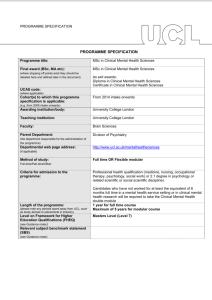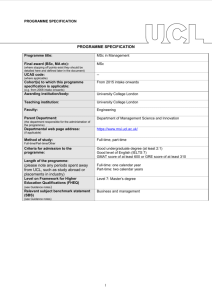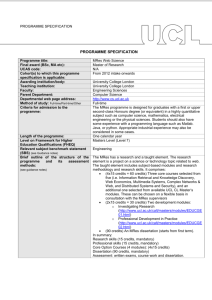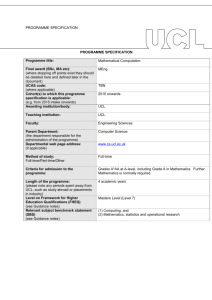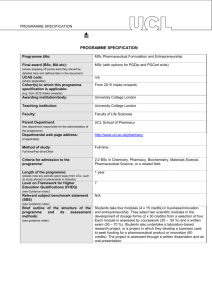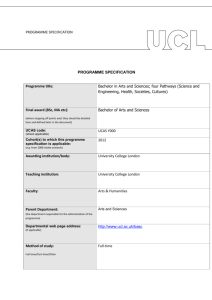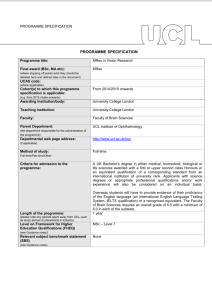MSc Mental Health Sciences Research
advertisement
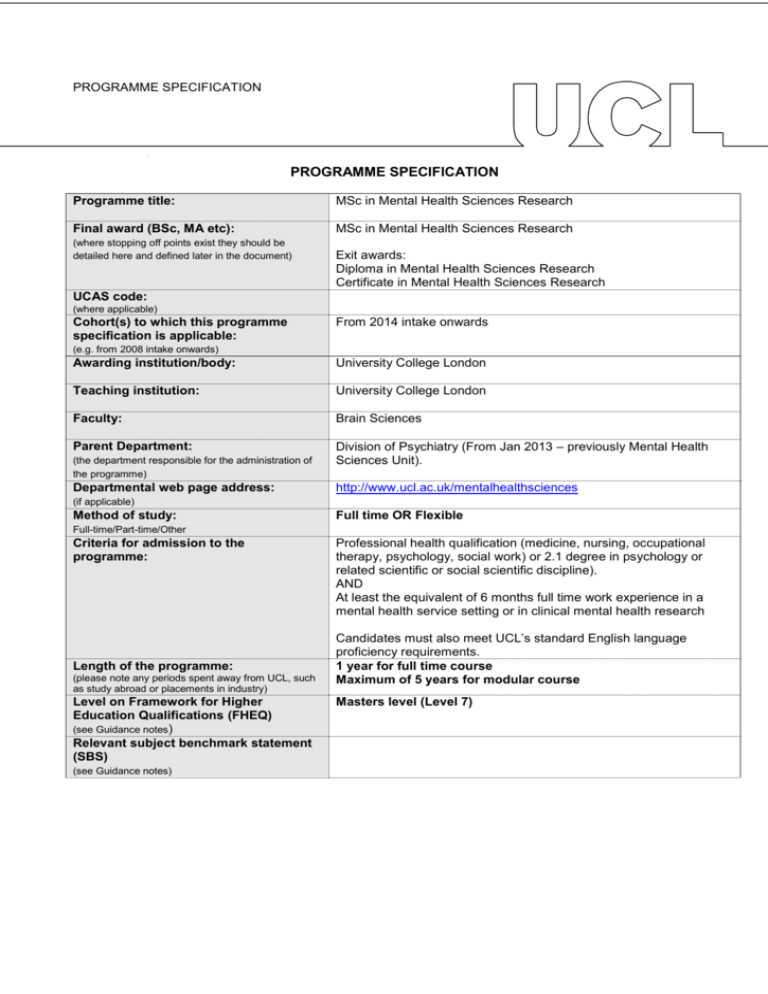
PROGRAMME SPECIFICATION PROGRAMME SPECIFICATION Programme title: MSc in Mental Health Sciences Research Final award (BSc, MA etc): MSc in Mental Health Sciences Research (where stopping off points exist they should be detailed here and defined later in the document) Exit awards: Diploma in Mental Health Sciences Research Certificate in Mental Health Sciences Research UCAS code: (where applicable) Cohort(s) to which this programme specification is applicable: From 2014 intake onwards (e.g. from 2008 intake onwards) Awarding institution/body: University College London Teaching institution: University College London Faculty: Brain Sciences Parent Department: Division of Psychiatry (From Jan 2013 – previously Mental Health Sciences Unit). (the department responsible for the administration of the programme) Departmental web page address: http://www.ucl.ac.uk/mentalhealthsciences (if applicable) Method of study: Full time OR Flexible Full-time/Part-time/Other Criteria for admission to the programme: Length of the programme: (please note any periods spent away from UCL, such as study abroad or placements in industry) Level on Framework for Higher Education Qualifications (FHEQ) (see Guidance notes) Relevant subject benchmark statement (SBS) (see Guidance notes) Professional health qualification (medicine, nursing, occupational therapy, psychology, social work) or 2.1 degree in psychology or related scientific or social scientific discipline). AND At least the equivalent of 6 months full time work experience in a mental health service setting or in clinical mental health research Candidates must also meet UCL’s standard English language proficiency requirements. 1 year for full time course Maximum of 5 years for modular course Masters level (Level 7) Brief outline of the structure of the programme and its assessment methods: (see guidance notes) This course will allow students to develop an in-depth understanding of the field of mental health which is tailored to their specific needs. The course may be taken either as a fulltime one year course, or as a flexible modular course over a maximum of 5 years. Students will complete: - Modules on research methods to the value of at least 75 credits. 30 credits of this will be made up by a core double module introducing research methods which will be compulsory for the course, and 15 credits by the statistics module (or an approved substitute in statistics/methods of analysis). At least another 30 credits must be selected from the other research methods modules offered on the course and other research methods options approved by the Course Directors. Already approved modules include - At least two of the Current Research in Dementia, Current Research in Psychosis, Current Research in Common Mental Health Problems and Current Research in Learning Disability modules (15 credits each). - A dissertation (60 credits) that reports original research findings. One further remaining module may be freely chosen from those available at UCL. Students will be able to choose between a primary focus on epidemiological and social methods or on biological methods in keeping with their primary interests, and will be guided in selecting modules in keeping with this in order to assemble a taught post-graduate programme that equips them to carry out doctoral research in their chosen field. The Certificate in Mental Health Sciences Research will be awarded to candidates who complete the core compulsory double module AND any other two modules that are accepted for the course (60 credits in total). The Diploma in Mental Health Sciences Research will be awarded to candidates who complete all taught elements of the course, but not the final dissertation (120 credits in total). Both the above are offered as exit awards rather than as awards for which candidates apply at entry. Board of Examiners: Professional body accreditation (if applicable): Name of Board of Examiners: Mental Health Sciences (to incorporate the previous MSc in Psychiatric Research) Date of next scheduled accreditation visit: EDUCATIONAL AIMS OF THE PROGRAMME: The MSc in Mental Health Sciences Research is intended for clinicians in mental health who wish to develop as researchers, and for researchers who already have considerable experience in clinical settings. It will provide them with a high quality training in research skills relevant to mental health, allowing a focus on either epidemiological and social or biological methods in keeping with students’ interests. The aim of the course is to prepare students to go on to undertake research at doctoral level, to apply for posts in university departments, and to collaborate in research studies. PROGRAMME OUTCOMES: The programme provides opportunities for students to develop and demonstrate knowledge and understanding, qualities, skills and other attributes in the following areas: A: Knowledge and understanding Knowledge and understanding of: Teaching/learning methods and strategies: How to recognise and formulate problems How to formulate research questions & develop protocols Original, independent & critical thinking Principles of active learning Ethical principles in psychiatric research, workings of research ethics committees Recent and current research directions in at least two fields of mental health research Principles of research methods used in psychiatry, including: Systematic reviews of the literature (including and introduction to the techniques used in meta-analysis) Instrument design, selection and testing Epidemiological methods, especially such as cross-sectional surveys, cohort studies and case-control studies Methods used in evaluating treatments, including randomised controlled trials, quasi-experiments, evaluations of treatment process and content, health economic methods and user-led evaluations Research methods used in biological psychiatry, including neuro-imaging, genetic and neurochemical and neuropharmacological methods Qualitative research methods, including semi-structured interviewing, focus groups and participant observation. Computer-assisted content analysis of qualitative data Major statistical methods used in psychiatric research Workshops in which students work together on research problems Seminars Student-led presentations Student design of poster presentations summarising research findings Individual tutorials Completion of coursework assignments Attendance at a planned programme of research presentations beyond the course framework Completion of supplementary reading and materials on line via Moodle. As there is considerable scope for selecting modules within the above, the extent to which students focus on each of the above varies, and additional areas of knowledge will be introduced where students take additional modules from elsewhere in the School of Life and Medical Sciences. Supervised work on a research study or other major dissertation project. Assessment: To include: Design of a research instrument and a plan for testing its psychometric properties. Design of draft research protocols, one for an epidemiological study, the other for an evaluation of a biological study Completion of a piece of qualitative data analysis. Completion of analysis of a statistical data set Unseen written examination testing grasp of research principles and procedures. Poster presentations accompanied by brief talks summarising current knowledge on research questions. Completion of original report, presenting either a report on a research study OR a major review of a research or clinical topic OR a report on a planned piece of service evaluation or development. Report will be assessed for coherence of formulation of question, evidence of original thinking scientific clarity, appropriateness of design and analysis, interpretation of information. B: Skills and other attributes Intellectual (thinking) skills: (i) Understand the biological, (ii) (ii) (iii) (iv) (v) (vi) (vii) epidemiological, psychological and social approaches to mental illness and how these may be integrated in practice and in research. Apply ethical principles in considering the diagnosis and management of mental health problems and the design and conduct of psychiatric research. Interpret reported results of research studies from independent and intelligently critical perspective, with awareness of context. Synthesise findings from different research studies and approaches with clinical knowledge to achieve an integrated understanding of mental illnesses and their management. Formulate coherent and significant questions on research, clinical management, service delivery and policy, based on awareness of the current status of knowledge in the field. Think creatively and logically about how to apply major psychiatric research methodologies to a new research question. Observe and record findings accurately Understand the various perspectives on mental health care and research, including those of service users, carers, clinicians and service planners. Teaching/learning methods and strategies: Students will be encouraged to develop these skills throughout: Workshops in which students work together on problems and/or complete practical tasks Seminars Student-led presentations Individual tutorials Completion of coursework assignments, including final major project. Assessment: In assessing the coursework assignments, examination, literature review and final project report, evidence will be sought of ability to apply thinking skills of these types. C: Skills and other attributes Practical skills (able to): All students will acquire the following skills: (i) Communicate clearly verbally and in writing (ii) Present work effectively to small group (iii) Make decisions and manage time effectively (iv) Manage projects effectively through setting of goals, milestones and priorities (v) Use computers and the internet competently for word processing, preparation of presentations, literature searches, and e learning via Moodle. (vi) Use systematic and comprehensive strategies to retrieve the literature on a particular topic (vii) Critically appraise research findings in balanced way (viii) Report in a clear, systematic and balanced way on a literature review (ix) Design simple research instruments such as questionnaires and formulate an approach to testing their psychometric properties (x) Evaluate and select appropriate research instruments in psychiatry. Depending on choice of modules, students will also be able to: 1. Write a structured protocol applying psychiatric research methodology in logical and creative way to investigation of a research question 2. Assess the feasibility of implementing a research design, taking into consideration constraints on resources and time 3. Understand and apply research data collection techniques from various paradigms of mental health research. 4. Apply methods of statistical analysis frequently used in psychiatry to data analysis using SPSS PC 5. Carry out content analysis of qualitative data in a systematic way 6. Prepare briefs for service planners and policy makers on major issues in mental health service delivery. Teaching/learning methods and strategies: These practical skills will be develop and demonstrated throughout the course by methods including: - Participation group discussions at seminars Practical workshops at which a range of these skills are applied Meetings with researchers, clinicians and service users in mental health Verbal and poster presentations on a range of research and clinical topics. Writing and analytical skills will be applied throughout coursework assignments and in unseen exam. Assessment: A range of these practical skills will be required for completion of each coursework assignment, exam and final project. D: Skills and other attributes Transferable skills (able to): (i) (ii) (iii) (iv) (v) (vi) (vii) (viii) (ix) (x) (xi) Learn actively and effectively Apply both critical and creative thinking to problem solving Manage time and exercise self discipline to complete substantial pieces of work efficiently Work independently and show initiative Use support of supervisors, tutors and peers effectively Communicate effectively verbally and in writing Communicate confidently and sensitively with service users, carers, clinicians and researchers in mental health. Listen to others and give and receive feedback constructively. Present and defend ideas to others in coherent and convincing way Develop cooperative network with supervisors and peers Analyse published evidence in balanced way, taking overall context into account. Teaching/learning methods and strategies: These skills will be developed throughout the course. Those on the clinical pathway who do not already have substantial clinical experience in mental health will have a variety of opportunities to meet clinicians, service users and carers. The coursework will involve both written presentations and some oral presentations, ensuring that a full range of communication skills are employed. Assessment: Skills i-vi, and viii-ix and xi will all need to be developed for the student to succeed in completing the course. The others are not formally assessed, but will also be promoted by the course and will help the student succeed in the course. The following reference points were used in designing the programme: the Framework for Higher Education Qualifications: (http://www.qaa.ac.uk/en/Publications/Documents/Framework-Higher-Education-Qualifications-08.pdf); the relevant Subject Benchmark Statements: (http://www.qaa.ac.uk/assuring-standards-and-quality/the-quality-code/subject-benchmark-statements); the programme specifications for UCL degree programmes in relevant subjects (where applicable); UCL teaching and learning policies; staff research. Please note: This specification provides a concise summary of the main features of the programme and the learning outcomes that a typical student might reasonably be expected to achieve and demonstrate if he/she takes full advantage of the learning opportunities that are provided. More detailed information on the learning outcomes, content and teaching, learning and assessment methods of each course unit/module can be found in the departmental course handbook. The accuracy of the information contained in this document is reviewed annually by UCL and may be checked by the Quality Assurance Agency. Programme Organiser(s) Professor Sonia Johnson Name(s): Date of Production: 14 October 2013 Date of Review: October 2014 Date approved by Head of October 2014 Department: Date approved by Chair of October 2014 Departmental Teaching Committee: Date approved by Faculty November 2014 Teaching Committee
